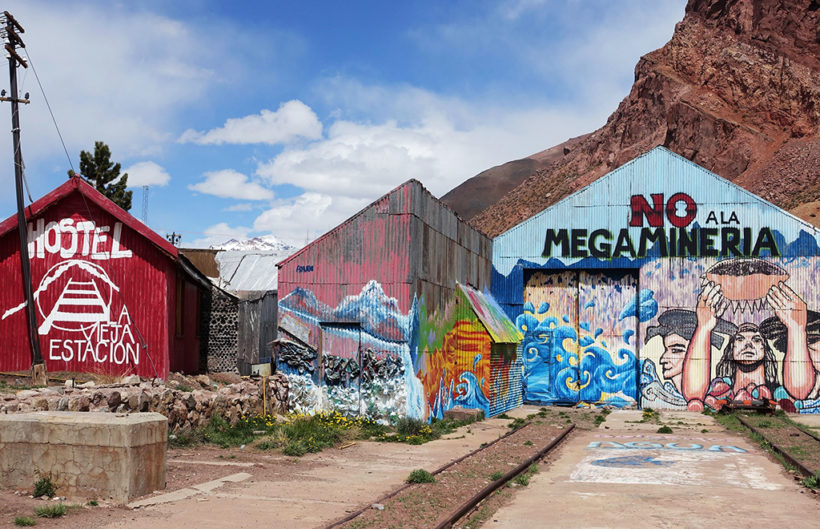In a context of climate crisis, the United Nations Human Rights Council declared that a clean, healthy and sustainable environment is a human right. Socio-environmental assemblies and indigenous peoples in Argentina denounce extractivism as the epicentre of rights violations.
The United Nations (UN) Human Rights Council declared that a clean, healthy and sustainable environment is a fundamental human right. It did so in a resolution that received 43 votes in support and none against. Amnesty International welcomed the move: “It is a milestone in the battle against the climate crisis. In Argentina, indigenous communities and socio-environmental assemblies have been denouncing for decades that mega-mining and agribusiness, among other extractive activities, violate human rights.
Resolution “A/HRC/48/L.23” of the Human Rights Council recognises the right to a healthy environment “as an important human right for the enjoyment of human rights” and urges states to protect the environment as part of their human rights commitments. The UN body stressed that the right to a safe, clean, healthy and sustainable environment is closely linked to other internationally recognised human rights. Environmental degradation damages the exercise of the right to health, to decent housing and to education, among others.
The Coordinadora Basta es Basta brings together socio-environmental assemblies and activists from all over Entre Ríos. Since January 2018, they have been demonstrating every Tuesday in front of the provincial Government House to denounce the fumigations with toxic agro-chemicals. They call the action “the Tuesday round”. On 9 November they held their 200th march. “We marched in front of the closed doors of the Casa Gris (government), in front of the ears and microphones that are closed to the biggest environmental conflict in the province and perhaps in the country. Nor did they listen to the Mothers of Plaza de Mayo 45 years ago. They still don’t listen to us, but the history of our people will put things in their place sooner rather than later, because human rights must be honoured every day,” said Daniela Verzeñassi from Paraná, and recalled that for decades they have been explaining that one cannot talk about human rights without addressing the socio-environmental situation.
She affirms that they are mobilising to demand that the provincial government change its production model and policies that support a transition towards agroecology. “We resist in our territories, with our bodies, and we also insist that another model, without agrotoxins, is possible, necessary and urgent,” he says.
Saúl Zeballos is part of the Jáchal No Se Toca Assembly in San Juan, where for more than a decade they have been denouncing the actions of the Barrick Gold company in its Veladero project. Zeballos has no doubt that the extractive model systematically violates human rights. “We explain that here we live in a mega-mining dictatorship, where corporations decide over territory and people. And where both the political and judicial powers are partners of the companies”, he said.
By way of example, he recalled that Barrick Gold violated the Glaciers Law, polluted rivers (in 2015 it caused the largest spill in the history of mining in Argentina) and did not receive any judicial sanction. Zeballos specifically questioned the Supreme Court of Justice of the Nation, which has delayed a ruling on Barrick Gold’s Pascua Lama project for thirteen years. And he warned about the new mining project, called Josemaría, “also located in a glacier area and without a social licence for the population”. He denounced that “there is no rift” between political sectors when it comes to promoting mega-mining. The assembly member welcomed the UN resolution, but clarified: “What is needed, more than declarations, is the practical and effective application of human rights”.
Clemente Flores is one of the spokespersons of the Mesa de Pueblos Originarios de la Cuenca de Guayatayoc y Salinas Grandes (Jujuy). He explains that the indigenous struggle for territory has always been and continues to be understood from a human rights perspective, although he regrets that part of non-indigenous society finds it difficult to understand this link. “We are fighting against lithium mining because it destroys our territory, above all it pollutes and puts our water at risk, which is vital for our lives,” Flores summarises.
He clarifies that, because of the pandemic, the communities were unable to meet in their traditional assemblies, while the mining companies were able to move forward with their explorations, without respecting the rights of the indigenous peoples. “There is a lot of talk about climate change but very little is done. In the Puna we are already suffering from climate change and with lithium mining it will be worse. That is why we are fighting, because water is a human right, even if the mining companies and governments don’t want to understand it,” warns Flores.
The UN resolution, passed on 8 October, was promoted by Costa Rica, the Maldives, Morocco, Slovenia and Switzerland. Only Russia, China, India and Japan abstained from voting.
Ashfaq Khalfan, director of Amnesty International’s International Law and Policy Programme, said: “This resolution is a hope in the current context of increasing widespread climate disasters and a milestone in the battle against environmental degradation. The Commission has finally recognised that the enjoyment of human rights depends on the environment in which we live. When the planet suffers, the people who live on it suffer too, and all over the world environmental degradation is robbing people of their rights.
The Amnesty International director also pointed the finger at those responsible: “The failure of governments to protect the planet and their continued support for industries that are destructive to the environment is a large-scale attack on human rights.






